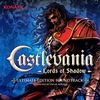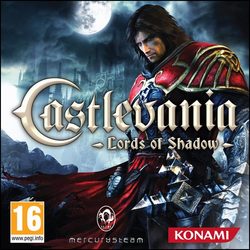Track Listing
| 1. | Besieged Village | 4:23 |
| 2. | The Warg | 3:26 |
| 3. | Hunting Party | 2:28 |
| 4. | The Dead Bog | 2:31 |
| 5. | Swamp Troll | 5:03 |
| 6. | The Ice Titan | 4:12 |
| 7. | Labyrinth Entrance | 3:17 |
| 8. | Waterfalls of Agharta | 2:45 |
| 9. | Aghartha | 1:26 |
| 10. | Cornell | 4:12 |
| 11. | Maze Gardens | 3:18 |
| 12. | Castle Hall | 4:09 |
| 13. | The Evil Butcher | 4:10 |
| 14. | Laura's Mercy | 1:38 |
| 15. | Carmilla | 2:03 |
| 16. | The God Mask | 1:18 |
| 17. | Belmont's Theme | 2:53 |
| 18. | Final Confrontation | 6:09 |
| 19. | The End | 5:47 |
| 20. | The Last Battle | 1:27 |
| Total Album Time: | 66:35 |
Related Albums

Castlevania: Lords of Shadow - Ultimate EditionSumthing Else Music Works
Released: October 29, 2013
Formats: CD, Digital (104 min)
Review: Castlevania: Lords of Shadow
4.5 / 5 Stars
Recent success of video game scores, brought on in part due to the successful franchises such as Medal of Honor and Halo, have raised the bar and drawn attention to the potential for music composed for this medium. Continuing this upward trend is the recently released Castlevania: Lord of Shadows, a relaunch of the franchise that originated in 1986. Replacing Michiru Yamane as composer for this project is relatively unknown Spanish composer, Óscar Araujo. Also replaced is the rock and synthesized sound of these scores in favor of a fully orchestral score that is, in a word, epic. Part of the relaunched franchise's marketing push was the fact that Araujo's score features the 120-piece Bratislava Symphony Orchestra and an 80-person choir. The result is without a doubt one of the best video game score I have heard in years and even stands on its own against fantasy action film scores.
Fans of the earlier scores to the Castlevania franchise may lament the lack of any musical reference to Yamane's previous works. And while Araujo does not develop a clear main theme, there are plenty of thematic ideas that percolate through the music to keep the listener interested throughout the entirety of the album. A common frustration of mine is when a video game score has a great main title cue, which is never returned to in the generic underscore. This is not the case with Lord of Shadows. The melodic and rhythmic ideas are woven throughout the entirety of the score. Two themes, which I identify here as the A and B themes, stand out, and are only heard together in the finale cue after the development across the rest of the score, in "Final Confrontation".
The A theme, a series of brass chords, is introduced at the beginning of "The Warg", backed by pounding war drums and choir. "Ice Titan", one of my favorite cues, leads into this theme with the choir and percussion, building to the theme in the brass and underscores by racing string ostinatos. A quieter version of this theme can be heard in the solo violin at the end of "Laura's Mercy", illustrating the theme's versatility. The B theme is less so, and is used less frequently, and is in fact only heard in full at the end of "Final Confrontation", following a bold statement of the A theme. It can first be heard in the strings in "Labyrinth Entrance" and "Laura's Mercy", as well as hinted at at the very beginning of "Cornell" as a descending motif. Only the A theme is heard at the close of the album in the solo violin before a final orchestral and choral statement in "The Last Battle".
Comparisons will be made to the Lord of the Rings scores, but it actually is more along the lines in tone of Debney's score for the video game Lair, featuring heavier orchestrations and relying less on thematic development. Lord of Shadows also has a more gothic feel, with the strong presence of low brass and choir mixed with war drums and other percussion, like Silvestri's Van Helsing or Elfman's Sleepy Hollow. These heavy orchestrations make up the first six cues, and then the album slows down until the finale pieces. This does make the album pacing seem a bit off, as the middle portions drag. However, the slower cues in the middle, such as "Laura's Mercy" and "Waterfalls of Agharta" allow for more thematic development. The only out of place cue is "Belmont's Theme", which is a sound not heard elsewhere in the score. The other component missing here, as I mentioned before, is a main title, which most video games have, which would have helped introduce the thematic elements. Listeners should seek out the "Final Confrontation" cue for good representation of the themes, instead.
Óscar Araujo's score for Castlevania: Lord of Shadows is nothing short of extraordinary. The use of the 80-person choir throughout, in nearly almost every cue, elevates this score to another level, adding a gothic and epic tone to an already massive and impressive sounding orchestra. Unfortunately, this soundtrack is only available as part of the "Collector's Edition" of the video game - it does not have a stand-alone album release yet. However, fans of large epic scores should seek it out whenever it does become available, and hopefully Araujo will become more of a visible presence in the video game and film score industry soon.
-
Click stars
to rate.
If any information appears to be missing from this page, contact us and let us know!
